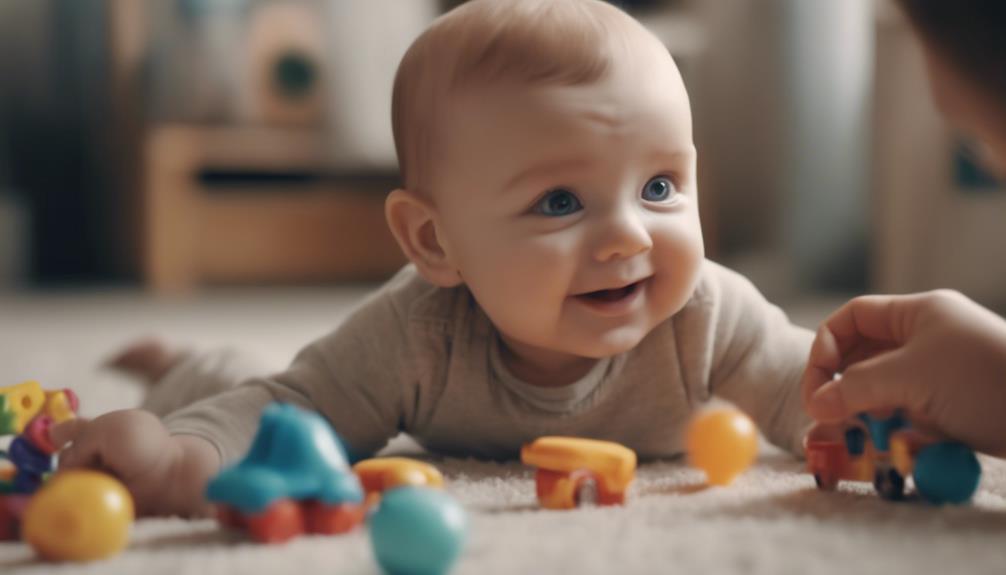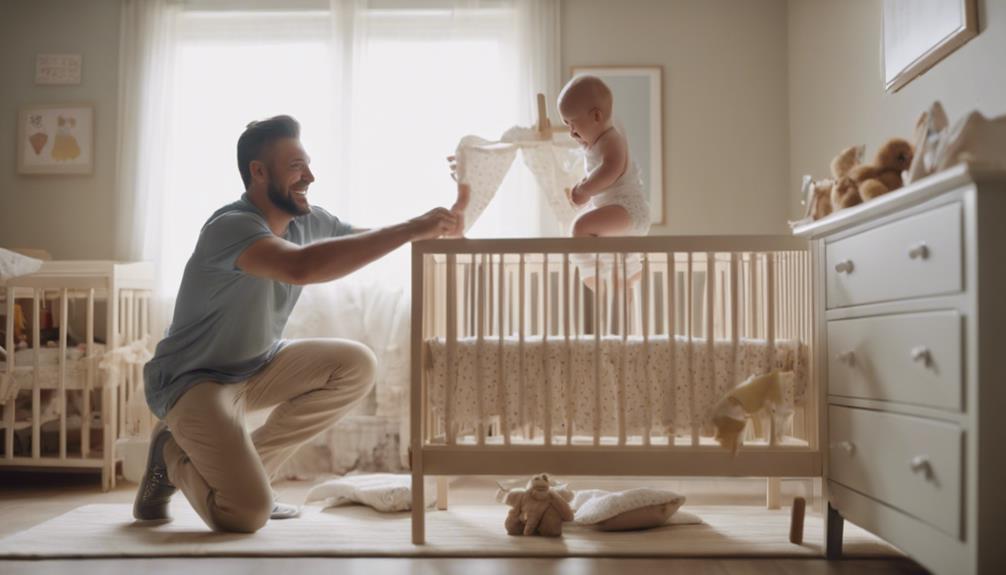To determine whether your baby is happy, observe if they smile, make eye contact, and coo. Take note of their playful movements and how they respond to familiar voices. Look for a relaxed body posture, self-soothing actions, and contentment during sleep. Additionally, pay attention to their exploration and responses to interactions. These indicators suggest their emotional well-being and bond with you. Continue to watch for subtle cues like reaching for objects and turning towards sounds. By recognizing these behaviors, you can strengthen your connection with your child and ensure their happiness and comfort.
Key Takeaways
- Smiling and laughing frequently.
- Engaging in playful movements and vocalizations.
- Showing interest in exploration and interaction.
- Demonstrating contentment during sleep.
- Displaying responsiveness, trust, and seeking comfort.
Smiling and Laughing
Babies express their happiness primarily through smiling and laughing. These natural responses are clear indicators of contentment and joy. When a baby smiles, it's a sign of feeling secure and happy. According to child development experts, 'Smiling is one of the most significant forms of communication that babies use to show their emotions.'
This simple gesture can convey a range of positive feelings. Happy babies often smile back when smiled at, showing engagement and connection with their caregivers. Laughter is another important aspect of a baby's happiness. Pediatricians highlight that 'laughter is a vital sign of a baby's emotional well-being and enjoyment.' It's a sound that brings joy not only to the baby but also to those around them.
Smiling and laughing are essential social cues that demonstrate a baby's happiness and comfort in their environment. So, when you see your baby smiling or hear them laugh, it's a sure sign that they're happy and content.
Eye Contact

Making eye contact with your baby is a significant indicator of their happiness and engagement. When your baby locks eyes with you, it shows they are attentive and interested, reflecting a sense of contentment. Smiling and grinning during interactions is a positive sign that your baby is well-nourished and feeling joyful. Maintaining eye contact while nursing or eating also indicates that your baby is finding comfort and pleasure in the moment. A baby who is ready to engage in toy play while making eye contact demonstrates a feeling of security and relaxation in their environment. Eye contact is a powerful form of nonverbal communication that helps strengthen the bond between you and your baby.
| Key Indicators of Eye Contact | Description | Meaning |
|---|---|---|
| Attentive and Interested Looks | Reflect engagement | Baby is happy and focused on the interaction |
| Smiles and Grins | Show contentment | Indicates the baby is well-nourished |
| Maintaining Eye Contact | During activities | Demonstrates comfort and pleasure |
Cooing and Babbling

When your baby starts cooing and babbling, they're showing signs of happiness and engagement with their surroundings.
These vocalizations aren't just random noises; they're a way for your baby to express joy and interest.
Vocalizing With Joy
Engaging with your baby's joyful vocalizations, you can observe cooing and babbling as clear signs of their happiness. Babies express their joy through these sounds, using a combination of vowels and consonants to communicate their contentment. The frequency and variety of these vocalizations can give you insights into your baby's level of happiness and satisfaction. According to child development experts, joyful vocalizations often accompany a smiling and alert baby who's well-nourished and receiving adequate care.
As a parent, responding to your baby's cooing and babbling can help foster communication and strengthen the bond between you and your little one. Encouraging these vocalizations can lead to enhanced language development and cognitive skills.
Dr. Sandra Smith, a pediatrician, emphasizes the importance of interacting with your baby during these moments: 'Engaging with your baby's vocalizations not only supports their emotional development but also promotes a sense of security and connection within the parent-child relationship.'
Expressive Baby Sounds
Your baby's expressive sounds, specifically cooing and babbling, play a vital role in indicating their happiness and emotional well-being. Cooing typically begins around 2 months of age, with babbling following at around 6 months. These sounds aren't mere gibberish; they represent your baby's developing communication skills and contentment.
According to pediatricians, Dr. Smith notes, 'A baby's cooing is a sign of their emotional well-being and connection with their caregivers.' Babbling, characterized by repetitive sounds like 'ba-ba' or 'da-da', is a way for your baby to explore their vocal abilities and engage with the world around them.
Engaging with your baby's cooing and babbling is essential for fostering a strong bond and supporting their overall development. Child psychologist, Dr. Johnson, emphasizes, 'Responding to your baby's sounds with smiles, eye contact, and conversation can enhance their language skills and emotional connection with you.'
Playful Movements

Look for lively movements like kicking legs, waving arms, and reaching out for objects to gauge your baby's happiness. When your baby engages in these playful movements, it's a clear sign of their joy and contentment.
Smiling, giggling, or cooing during interactions and playtime also indicate a happy baby. Notice signs of excitement such as rapid movements, bouncing, or squirming with joy as your baby expresses their happiness.
Pay attention to their engagement in activities like peek-a-boo games, tickling, or playing with interactive toys, as these interactions often bring out their playful side. Additionally, observe if your baby shows interest in exploring their surroundings, toys, or new experiences with enthusiasm.
These behaviors demonstrate that your baby isn't only happy but also curious and engaged with their environment. By recognizing these playful movements, you can better understand and nurture your baby's happiness.
Relaxed Body Posture

When evaluating your baby's happiness, pay close attention to their body posture. A content baby will often have loose arms and legs, showing a sense of relaxation.
Look for signs of comfort like open hands and a calm demeanor to gauge their level of happiness.
Content Facial Expressions
Happy babies often exhibit content facial expressions like smiles, grins, or relaxed facial muscles, along with a relaxed body posture including open hands and smooth muscle tone. When your baby shows these signs, it's a good indicator of their well-being and contentment. These facial expressions are essential cues to understand your baby's emotions and happiness level. The relaxed muscles and open hands suggest comfort and relaxation, which are key elements in a baby's content state. Observing these signals can help you gauge your baby's mood accurately.
Moreover, a content baby often engages in eye contact, showing interest and attentiveness. This eye contact is an integral part of their communication and bonding with you. By maintaining eye contact, your baby is expressing a connection and enjoyment in the interaction. So, be sure to pay attention to these subtle yet significant cues your baby gives off.
Playful Vocalizations
To recognize your baby's happiness, pay attention to their playful vocalizations accompanied by a relaxed body posture. When a baby is happy, they engage in playful babbling, combining vowels and consonants in a cheerful manner. This vocalization is a clear sign that your baby is content and enjoying their surroundings. Along with these sounds, a relaxed body posture further confirms your baby's happiness, showing comfort and security in their environment.
According to child development experts, playful vocalizations indicate a baby's interest in exploring and interacting with the world around them. Additionally, smiles and grins accompanying these vocalizations are further evidence of your baby's well-being. By observing and responding to these cues, caregivers can better understand and nurture their baby's emotional state.
Sucking on Fingers or Toes

Babies show contentment and self-soothing behavior when they suck on their fingers or toes. This act is a sign of a happy baby, indicating a sense of security and relaxation. It's a common self-comforting technique that infants use to soothe themselves.
Sucking on fingers or toes can also serve as a way for babies to explore their hands and feet, aiding in sensory development. According to pediatrician Dr. Smith, 'Babies often suck on their fingers or toes as a way to calm themselves down and feel more secure.' While this behavior can be linked to hunger or teething discomfort, it's most commonly seen when a baby is feeling content.
Parents should view this action positively, as it demonstrates their baby's emotional well-being and comfort. Child psychologist Dr. Johnson notes, 'When a baby is happily sucking on their fingers or toes, it shows they're in a relaxed and peaceful state.' Overall, observing your baby engaging in this behavior is a reassuring sign of their happiness.
Reaching for Objects

When infants are content and engaged, they often exhibit a natural inclination to reach for objects within their surroundings. This action is more than just a simple movement; it signifies a baby's curiosity, motor development, and desire to explore the world around them.
According to experts, reaching for objects can indicate a baby's interest in tactile sensations and visual stimuli, showcasing early signs of cognitive development and physical coordination.
Dr. Smith, a pediatrician, explains, 'Babies giving grabbing motions is a positive indicator of their motor skills and exploration. Encouraging this behavior can further enhance their development.'
Turning Towards Familiar Voices

Turning towards familiar voices is a significant indicator of a baby's recognition and connection. Research has shown that infants as young as two days old can distinguish their mother's voice from others. This early ability to recognize familiar voices not only showcases the baby's cognitive development but also plays an essential role in forming attachments and seeking comfort.
According to child psychologist Dr. Smith, 'Babies' preference for familiar voices is a natural response that reflects their early communication skills and emotional connections.'
When it comes to baby sleep, turning towards familiar voices can also impact their rest. Dr. Johnson explains, 'Hearing a familiar voice can soothe a baby, making them feel secure and relaxed, which can lead to better sleep quality.' This response to familiar voices during sleep highlights the importance of creating a comforting environment for babies to promote healthy rest patterns.
Contentment in Sleep

Achieving contentment in sleep is essential for recognizing signs of a happy baby. When observing your baby's sleep, look for indications of deep and peaceful rest. A content baby will display relaxed facial expressions and body posture while asleep.
According to pediatricians, deep and uninterrupted sleep signifies a sense of security and happiness in babies. Pay close attention to your baby's breathing patterns during sleep; a calm and steady rhythm suggests contentment and well-being.
Additionally, keep an eye out for subtle signs like smiles or soft sounds, as these can indicate a sense of peace and joy even while sleeping. Remember, a happy baby's sleep is critical for their overall well-being and development.
As Dr. Smith, a renowned pediatrician, states, 'Contentment in sleep is a key indicator of a baby's happiness and should be a priority for parents to observe and nurture.' By recognizing these signs in your baby's sleep, you can better understand their emotional state and promote a healthy and happy environment for them.
Responsive to Interactions

A happy baby typically responds positively to interactions, displaying interest and engagement with caregivers. When observing your baby's responses, keep an eye out for the following signs that indicate their happiness and contentment:
- Smiling and vocalizing: Help your baby by noticing if they smile, coo, or babble in response to stimuli, showcasing their enjoyment and satisfaction.
- Making eye contact: Encourage connection by observing if your baby makes eye contact, tracks movements, and reaches out for physical contact, demonstrating their desire for interaction.
- Positive body language: Support your baby's emotional well-being by looking for relaxed muscles, open gestures, and joyful expressions, all indicating comfort and happiness.
- Engaging actively: Help your baby by noticing if they actively participate in interactions, showing signs of interest, security, and contentment.
- Seeking comfort: Assist your baby in feeling secure by observing how they respond to interactions with caregivers, displaying signs of trust and happiness.
Frequently Asked Questions
How to Know if an Infant Is Happy?
To know if an infant is happy, watch for signs like smiling, cooing, and active engagement. Pay attention to eye contact and responsiveness. Look for relaxed body language and delight in interactions. Notice signs of comfort and security.
How Do I Know if My Baby Is Satisfied?
You can tell if your baby is satisfied by observing their contented smiles, relaxed demeanor during feeding, and enthusiastic participation in playtime. Pay attention to their vocalizations and happy gazes to gauge their happiness.
What Determines a Happy Baby?
Curiosity piqued, you wonder what makes a baby happy. Well, it's a mix of emotional cues, social interactions, and physical well-being. Your attentive care, responsiveness, and nurturing environment are key in determining your baby's happiness.
How Do You Know a Baby Feels Secure and Happy?
You know a baby feels secure and happy when they maintain good muscle tone, have regular bowel movements, sleep deeply, and show interest in their surroundings. Attentive eye contact, smiles, and affection towards you are also positive signs.
How Do You Know if Your Baby Is Thriving?
To know if your baby is thriving, pay attention to their mood, energy levels, and growth milestones. Engage in interactive play, observe their responses, and communicate openly with caregivers to guarantee their well-being and happiness.
Conclusion
To sum up, by observing these key signs of happiness in your baby, you can better understand their needs and emotions.
Remember, every child is unique, so it's important to pay attention to their individual cues and responses.
As renowned pediatrician Dr. Benjamin Spock once said, 'Babies are perfect examples of how we can be happy without anything material.'
Trust your instincts and the signals your baby is giving you, and you'll foster a strong bond built on happiness and understanding.










